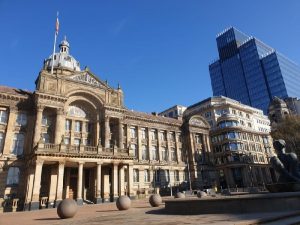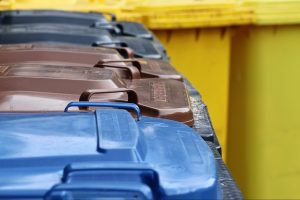Lockdown drives JLR to £422m full year loss

Luxury car maker Jaguar Land Rover has reported fourth quarter and full year pre-tax losses which will lead to the axing of around 1,100 agency staff at its car plants, after sales fell off a cliff following the coronavirus pandemic.
The group, which makes cars at three UK sites in Halewood, Merseyside, and Solihull and Castle Bromwich in the West Midlands, has announced results for the year ending March 31.
It said it made a pre-tax loss of £501m in the fourth quarter, while the pre-tax loss for the full year was £422m, on revenues of £5.4bn and £23bn, respectively.
Fourth quarter retail sales were 109,869 units, down 30.9% year-on-year, while full year sales totalled 508,659 vehicles, down 12.1% year-on-year.
The group said the COVID-19 pandemic significantly impacted quarter four and full-year fiscal figures for 2019/20.
The company said it returned to profitability with improved operating cash flow in the second and third quarters, reflecting double-digit retail sales growth in China, as well as cost and cash flow improvements under its Project Charge transformation programme.
Prior to the emergence of the COVID-19 pandemic, the company expected these trends to continue in the fourth quarter to achieve a full-year profit and meet its other financial targets for fiscal 2019/20.
The company ended the fourth quarter with solid liquidity of £5.6bn, including £3.7bn of cash and a £1.9bn undrawn revolving credit facility.
Jaguar Land Rover said it responded quickly to the COVID-19 situation, implementing a temporary shutdown of all plants and rigorous cost and investment controls to conserve cash.
The company is now seeing encouraging recovery in China and is gradually resuming production at the Solihull, Halewood and engine plants in the UK, as well as its Slovakia plant and the contract assembly line in Austria.
Chief executive, Prof Sir Ralf Speth, said: “Jaguar Land Rover’s early action to transform its business meant that as a company we were on track to meet our full-year expectations and operational and financial targets before the pandemic hit in the fourth quarter.
“We also reacted quickly to the disruption caused by COVID-19.
“Our immediate priority has been the health and wellbeing of our people – and this remains the case as we have now begun the gradual, safe restart of our operations.”
The company saw strong demand over the year for the new Halewood-built Range Rover Evoque, sales of which rose by 24.7% year-on-year and the all-electric Jaguar I-PACE, with sales up 40%.
Sales of the refreshed Land Rover Discovery Sport, also built at Halewood, are expected to continue to grow following its March launch in China.
New products will support the recovery of the business, including the ramp-up of the unparalleled new-generation Land Rover Defender; plug-in hybrid versions of the Range Rover Evoque and Land Rover Discovery Sport with new 1.5-litre 3-cylinder Ingenium petrol engine; and the exciting, newly-refreshed Jaguar F-TYPE.
The company is planning for a gradual recovery as lockdowns are relaxed and economies respond.
The pick-up in China has been encouraging with all retailers now open, contributing to unit sales of 6,828 vehicles in April – down only 3.1% year-on-year – and 8,068 in May, up 4.2%.
Sales of Range Rover and Range Rover Sport have been particularly encouraging.
Other regions saw the full impact of lockdowns in April and May, with total worldwide sales of 14,709 vehicles in April, down 62.5% year-on-year, and 24,024 in May, down 43.3%.
However, sales are expected to recover as retailers reopen. Most recently, about 89% of retailers worldwide are fully or partially open.
The company plans to resume production gradually to meet recovering demand.
The Solihull and Halewood vehicle manufacturing plants and engine plant in the UK, the Slovakia plant and contract manufacturing line in Graz, Austria, have restarted.
The reopening of the group’s other plants will be confirmed in due course, while the joint venture plant in China has been open since late February.
In this uncertain situation, the group said Jaguar Land Rover will continue to manage costs and investment spending rigorously to protect liquidity.
Cost and cash improvements under Project Charge increased by £600m in Q4 to bring cumulative savings to £3.5bn by March 31, 2020.
The company has increased the Charge target for March 2021 by £1bn to £5bn.
As part of this, JLR has been deferring or delaying lower-margin and non-critical investment.
The company is targeting investment spending in the region of £2.5bn in fiscal year 2020/21, substantially lower than the spending of £3.3bn in 2019/20 and £3.8bn in 2018/19.
Against the backdrop of the COVID-19 pandemic, the company said it has taken the difficult decision to reduce the number of contract-agency employees in its manufacturing plants over the coming months.
As a result of the impact of worldwide lockdowns on sales and plant shutdowns, free cash flow was negative, around £1.5bn in April and May, including one-time working capital outflows of approximately £1.2bn; free cash flow for the full quarter ending 30 June is expected to be less than £2bn negative.
The outlook with COVID-19 remains uncertain.
However, JLR said it expects a gradual recovery of sales consistent with industry estimates and improving cash flow boosted by the recovery of working capital, lower investment and other Project Charge cost reductions for the remainder of the current fiscal year.
Prof Sir Ralf Speth said: “In such uncertain times, I remain convinced that Jaguar Land Rover’s focus on its people, its innovative products and its Destination Zero mission will remain the key to navigating out of this global crisis effectively.
“In China, we are beginning to see recovery in vehicle sales and customers are returning to our showrooms. Our operational fitness gives me confidence that we can weather this storm.”









